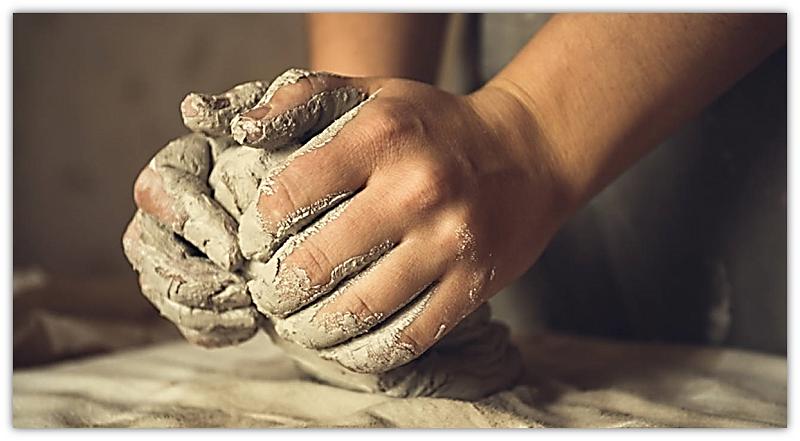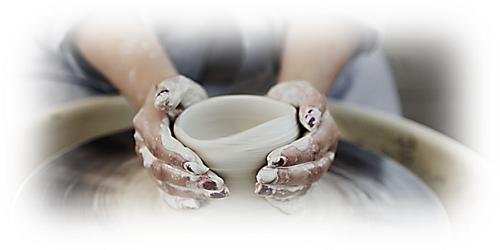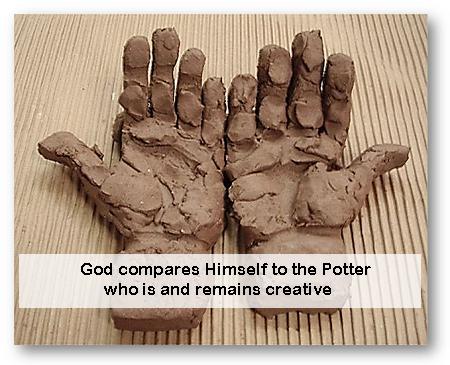Jeremiah 18:6 - Like Clay in the Hand of the Potter
Jeremiah 18:6 - Like Clay in the Hand of the Potter
Can I not do with you, Israel, as this potter does? declares the Lord. Like clay in the hand of the potter, so are you in my hand, Israel
Jeremiah 18:6

He can make and break us! We are the material in God’s hand. He can do with us as he sees fit. That is the Artist’s privilege. We are made the way He envisaged us. In a similar way this image is also used by Paul. God is sovereign and free to do as He will.
'Shall what is formed say to the one who formed it, ‘Why did you make me like this?’Romans 9:20
Yet, upon closer inspection, we see that the image of a Potter is used differently by Jeremiah.
Jeremiah is commissioned to go and look at an everyday scene: a potter at work. One could find these everywhere in the Ancient Near East, as one still can find them today in many parts of Africa. The potters then worked with two wheels (18:3). The potter’s wheel (or disk) was connected by a vertical axle to another stone wheel. The bottom wheel was driven by the foot so that the top wheel, serving as a plate upon which the clay lay, was turned as well. At the start it is just a lump of clay, but by turning the wheel it can take shape. The creator’s hands start to mould it into shape. He gently coaxes the clay upward and shapes it into what he has in mind. The potter wants to make something beautiful. As with everyone who loves his work, so he himself wants to make something he can be proud of, something to be admired. This requires great patience and artistic craftsmanship.
Only, in this instance, while Jeremiah is watching it is not working at all (18:4). The unmanageable clay suddenly slips away from the potter’s fingers. Today, not a single product emerges that is to his satisfaction. The material is unyielding and impossible to mould into shape. The clay is resisting his intentions - and even the craftsman can do nothing with this sample.
Then the potter removes from the wheel the whole object he has been working on for some time. He folds it back into a shapeless lump of clay and starts to knead it again. For he must have something useful that suits his purpose. He then carries on working for as long it takes, until he is satisfied; until it is exactly as he had envisaged (18:4). The potter is patient with the material even when it is intractable and unyielding. A good potter always masters his clay in the end.
Living Material⤒🔗
Here it is not a pot or vase that is finished, but one that still has to be moulded into shape (18:3). The material is still living, still moving, it can take on another shape. God is the Sculptor who continues to shape the model. He wants to model according to the image He envisages. In order for that to happen the material has to cooperate. The Creator Sculptor can only make something of it if it allows itself to be moulded into shape. Something good can only emerge if they cooperate and do not resist each other. That is how the Creator has created us, as living material, equipped with our own responsibility. It is a combined play between God and man. The Potter, who is extraordinarily artistic, moulds the shape but, at the same time, the material must cooperate. Their reactions partly determine what will happen, for nothing happens automatically. God demands a response. He associates with people in a serious manner, true to life, in an open relationship. He struggles to win the hearts of people, as a potter struggles to master his material.

Unmanageable Material←⤒🔗
How obstinate the material is! It does not give way, not even an inch. It is unyielding and will not do what the Maker wants, so that He can make nothing of it: unworkable, unmanageable. In this way nothing beautiful will come from his hands. It is doomed to fail. That is not God’s fault, as the Potter, for there is no lack of vision, expertise, craftsmanship or good intentions. But the material will not let itself be moulded. It is unyielding, inflexible, hard and resisting. It simply refuses. Nothing can be done with it. The people will not let themselves be shaped according to their Creator’s noble intentions.
It is not difficult to imagine this, considering what was going on in those days of King Jehoiakim (2 Kings 24). God had done so much to shape his people, and reshape them under the reign of the well-meaning King Josiah. There seemed to be the beginning of repentance and restoration. But the first signs of reform soon subsided. Everything became more important than God: the growing economy, the pull of free sexual morals, the political lobbies and diplomatic deals, one superpower eyeing up the other. In the meantime, the living God was being passed by and completely ignored.
Jesus, the greatest prophet, established the following in His days: what did God not do to form you, His people? But you were not willing (Mat 23:37). Therefore it is doomed to failure. Whoever refuses to allow God to shape him, and maintains a life without Him, fails. All the beautiful things that God envisaged will not emerge, more’s the pity.
Patient Reformation←⤒🔗
One would expect that at length the Lord would be completely done with it. When material resists more than it cooperates ... and people become so unmanageable... When the work that God has in hand fails, surely He will not struggle endlessly to make something of it? Indeed, there comes a time when He starts afresh. That is God’s style: like a potter making a new start, He does the same. God does not give up when the clay refuses to be moulded. He does not stop when all fails miserably. Neither does He cast away the failed project. He presses the lump of clay into a ball and He makes a new start. For He cannot leave His project. He is full of patience and perseverance. He will not rest until it is finished. He does all it takes to form His people, however unyielding and unmanageable they may be.
Jeremiah wants to move God’s people to commit themselves anew into the hands of God the Sculptor. The Sculptor wants nothing more than to make something beautiful from that same lump of clay – be it willing or unwilling. Sometimes clay needs a hard hand and considerable pressure to mould it. God does not cease nudging his people so that they are moulded into shape and built up, though it might mean that God places Himself in a vulnerable position before the forum of all nations. Nevertheless, there is a limit to His patience. If the clay is no longer fit for its original purpose, the potter makes something else out of it. The quality and pliability of the clay plays a part in determining what he can make of it.
Living Relation←⤒🔗
Our God is like a potter. He is free to use His material as he sees fit. He can make or break us. Yet this is not the point at issue here. It is about God taking very seriously our own responsibility.
For the Lord is not a potter who works in silence (18:6). By speaking, He seeks contact all through the ages. He utters His words through Jeremiah and demands an answer, a response (18:9-10). God maintains a living and open relationship with his people. God reveals His plan and this demands a response. And by now the plan that Jeremiah is revealing is a disaster scenario. Whether the prophet likes it or not, he is to contradict all those who make light of the situation: if you continue down this road, things will go from bad to worse and further down the drain. Improve your life: let yourself be reformed!
Just to make things clear, this is not an inevitable fate. Even in the face of the greatest threat and the clearest announcement of calamity, the possibility of repentance always remains. God does not write us off beforehand.
He keeps calling upon us to repent, up until the very last moment. All thoughts of inevitable doom are strange to Him. What He has said is not an unrelenting destiny. Certainly, God means what He says, like a parent who sincerely warns his child. But He always keeps the road to repentance open. The Lord never acts blindly, in a fixed consequential sequence, as if He is tied to his own words. He continually takes into account the changed circumstances and makes a strong appeal to our responsibility. There is room to move. God is sensitive to repentance.

Jeremiah may see things very darkly: there’s little chance of those people repenting. God had even forbidden him to intercede in prayer (7:16). So unmanageable and incorrigible is the mentality of these people. It is even so strong that obstinacy and unwillingness are voiced openly (18:12). God actually says in so many words that he does not count on repentance. He knows His people well enough and sees through them. But that is in itself compassion. He lays bare their unwillingness and even then offers room to repent. His association with people is so lively. He shows His love in the darkest threat. The prophecy of doom finds its most treasured fulfilment when it can be withheld because of repentance.
Flexible Plan←⤒🔗
God reconsiders... (18:10). In many Bible translations this has been translated as ‘God repented’. Is that possible? Can God turn back on His intentions? Does He adjust his clear-cut plans? Does God, then, not have a fixed plan? He is free to reconsider His resolve. But that does not mean that He has changed his mind, or that His plan has failed. He does not act willy-nilly, but in all freedom. God’s plan is flexible in all directions. He purposely anticipates what people do and draws up His plan accordingly. For He is sovereign and not dependent upon what people do. He achieves his purpose, but can do that by means of a radical change of course. If people react thus, He will do such and such. When people behave differently, He acts differently. He has taken all possible scenarios into account. God is only bound to Himself. He will not be tied down by consequences drawn by people, as though He were obliged to stick to what they want Him to stick to. What God has done and said previously does not limit His freedom regarding the future. He can change His plan according to the situation into which people bring themselves.
God compares Himself to the Potter who is and remains creative. He works patiently with living material and anticipates unerringly all varying circumstances.

Add new comment